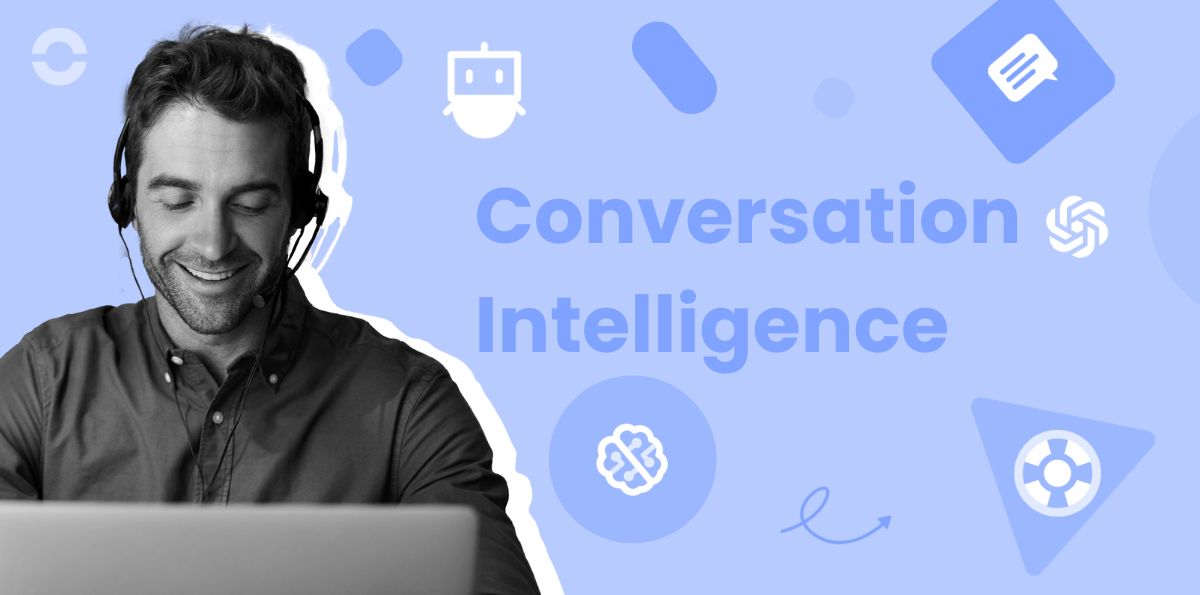Summary
- Table: Best 20 Conversation Intelligence Software
- List: 20 Conversation Intelligence Tools
- What is conversation intelligence?
- Why Is Conversation Intelligence Important for Sales and Customer Service Teams?
- How does conversation intelligence work?
- Different types of conversation intelligence tools
- What to remember about conversation intelligence
- Conversation Intelligence FAQ
Conversation intelligence is a rapidly growing branch of artificial intelligence. How can you leverage it for your customer service and sales teams?
Discover Conversation IntelligenceTable: Best 20 Conversation Intelligence Software
| Software Name | Description | Top Features |
|---|---|---|
| Empower by Ringover | AI-driven communication tool that provides insights for sales and customer service teams | Call recording, Conversation analytics, Coaching insights |
| Gong | AI-powered platform for revenue intelligence and sales conversation analytics | Deal insights, Call transcriptions, Pipeline management |
| Chorus.ai | AI-based conversation analytics platform focused on sales team performance | Call summaries, Sales coaching, Deal tracking |
| Salesloft | Sales engagement platform that includes conversation intelligence for improving sales performance | Call recording, Email tracking, Pipeline management |
| Wingman | Conversation intelligence platform designed for real-time sales coaching and call analytics | Call recordings, Real-time feedback, Sales playbooks |
| ExecVision | Conversation intelligence platform that helps teams analyze calls to improve sales outcomes | Call scoring, Customized coaching, AI-driven insights |
| Revenue.io | AI-driven conversation intelligence and sales acceleration platform | Real-time call analysis, AI recommendations, Coaching tools |
| Allego | Conversation intelligence for sales coaching and performance improvement | Call review, Sales coaching, AI-based recommendations |
| Outreach | Sales engagement platform with built-in conversation intelligence features for improving workflows | Call analytics, AI-driven recommendations, Coaching insights |
| Avoma | AI meeting assistant that provides conversation insights and summaries for customer interactions | Meeting transcription, Actionable recommendations, Coaching tools |
| TalkIQ | AI-powered conversation intelligence for analyzing and improving sales calls | Real-time transcription, Sentiment analysis, Deal tracking |
| Tethr | AI-based platform for call center and sales conversation analysis | Conversation analytics, Customer insights, Agent performance |
| Krisp | AI-powered noise cancellation and call analytics platform for improving communication quality | Noise cancellation, Call recording, Analytics dashboard |
| Balto | Real-time conversation intelligence platform for sales and customer service teams | Real-time call guidance, Coaching insights, Call analytics |
| Jiminny | Conversation intelligence platform focused on sales coaching and call analysis | Call transcription, AI recommendations, Sales performance tracking |
| CallRail | Call tracking and analytics platform with conversation intelligence features | Call recording, Lead tracking, Conversation analytics |
| OrecX | Open-source call recording and conversation intelligence platform. | Coaching insights, Call scoring, Sales team feedback |
| Observe.ai | AI-powered conversation intelligence for call centers to improve agent performance | Real-time analytics, Agent coaching, Customer sentiment tracking |
| Fireflies.ai | AI meeting assistant that transcribes and analyzes conversations to extract key insights | Call transcription, Actionable insights, AI-driven summaries |
List: 20 Conversation Intelligence Tools
1. Empower by Ringover
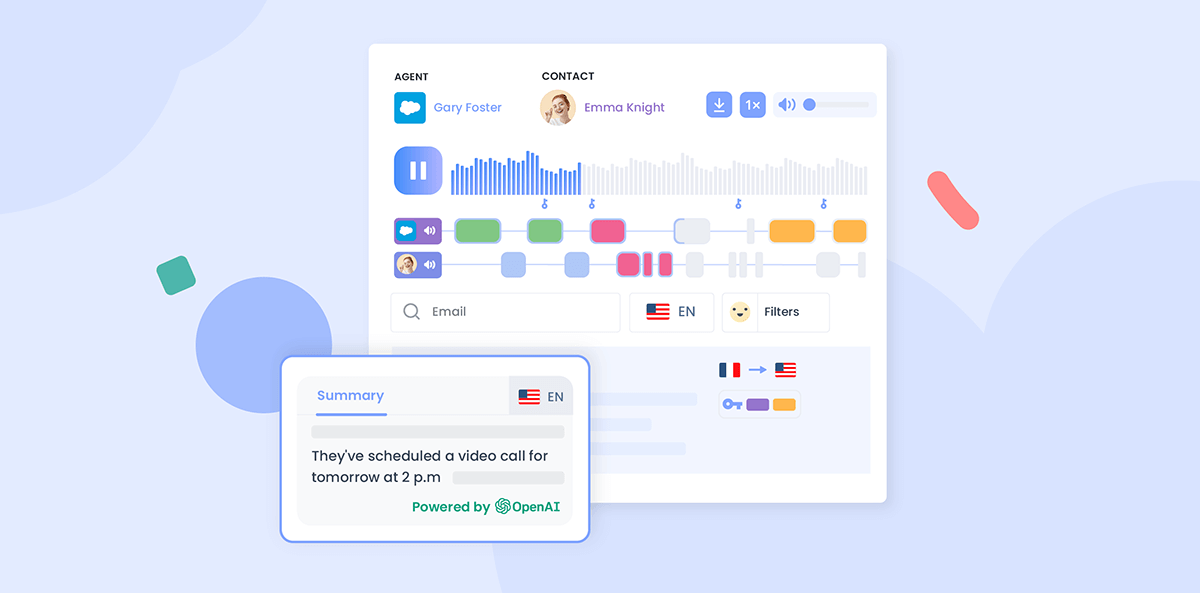
Empower by Ringover provides sales and customer service teams with AI-driven conversation intelligence software, helping improve performance through call recording, in-depth conversation analytics, and AI coaching insights. It supports revenue growth by enhancing communication efficiency, enabling better sales coaching, and optimizing customer service interactions. By analyzing calls, Empower offers actionable feedback that helps teams refine their pitch and communication style, ultimately leading to higher close rates and customer satisfaction.
Advantages✅
- Comprehensive coaching insights for sales and customer service teams.
- Provides actionable feedback from real-time analytics.
- Helps teams identify patterns for improving customer interactions.
Disadvantages❌
- May require time to integrate with existing systems.
2. Gong
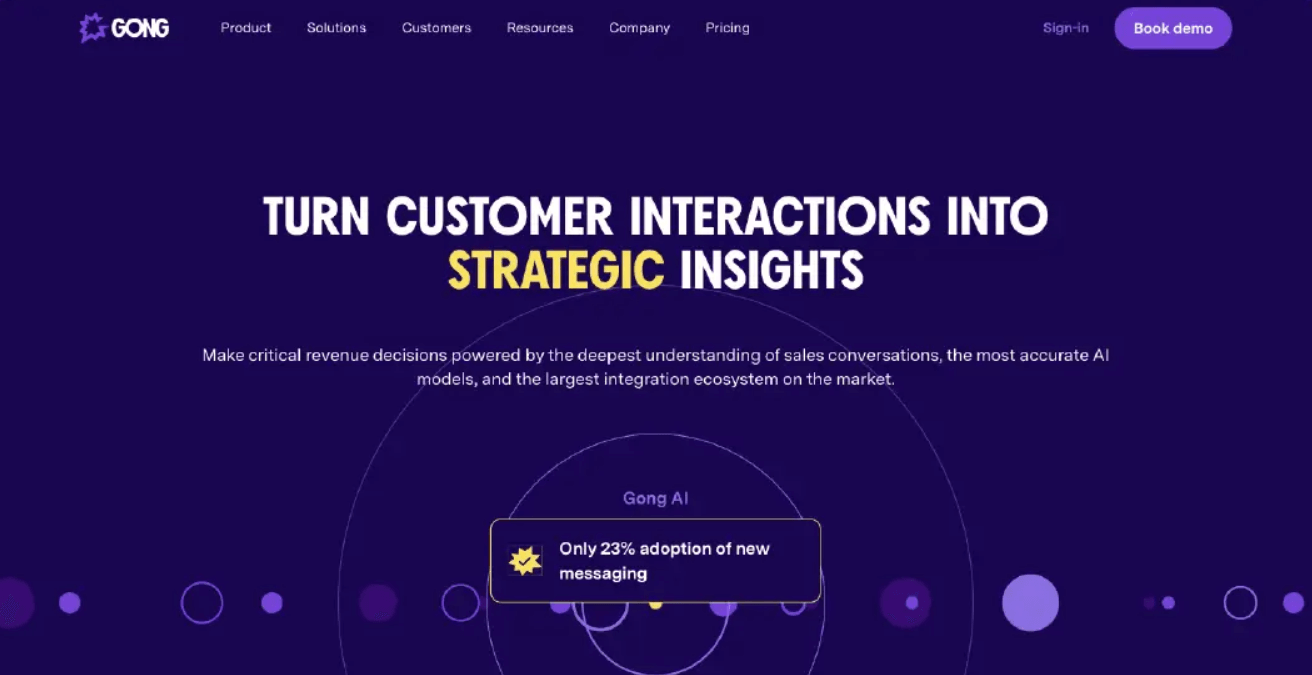
Gong is a leading AI-powered conversation intelligence platform that captures, analyzes, and provides insights from sales calls. By tracking deal progress and identifying winning behaviors, Gong supports revenue growth by enabling sales teams to adjust their strategies based on real-time data. Its deal insights feature helps teams focus on at-risk deals while maximizing high-potential opportunities.
Advantages✅
- Provides comprehensive deal and pipeline insights.
- Automated call transcriptions and sentiment analysis.
- Real-time suggestions for improving calls and deals.
Disadvantages❌
- Expensive for small teams or startups.
- High volume of data may require time to analyze.
- Integrations may be complex for new users.
3. Chorus.ai
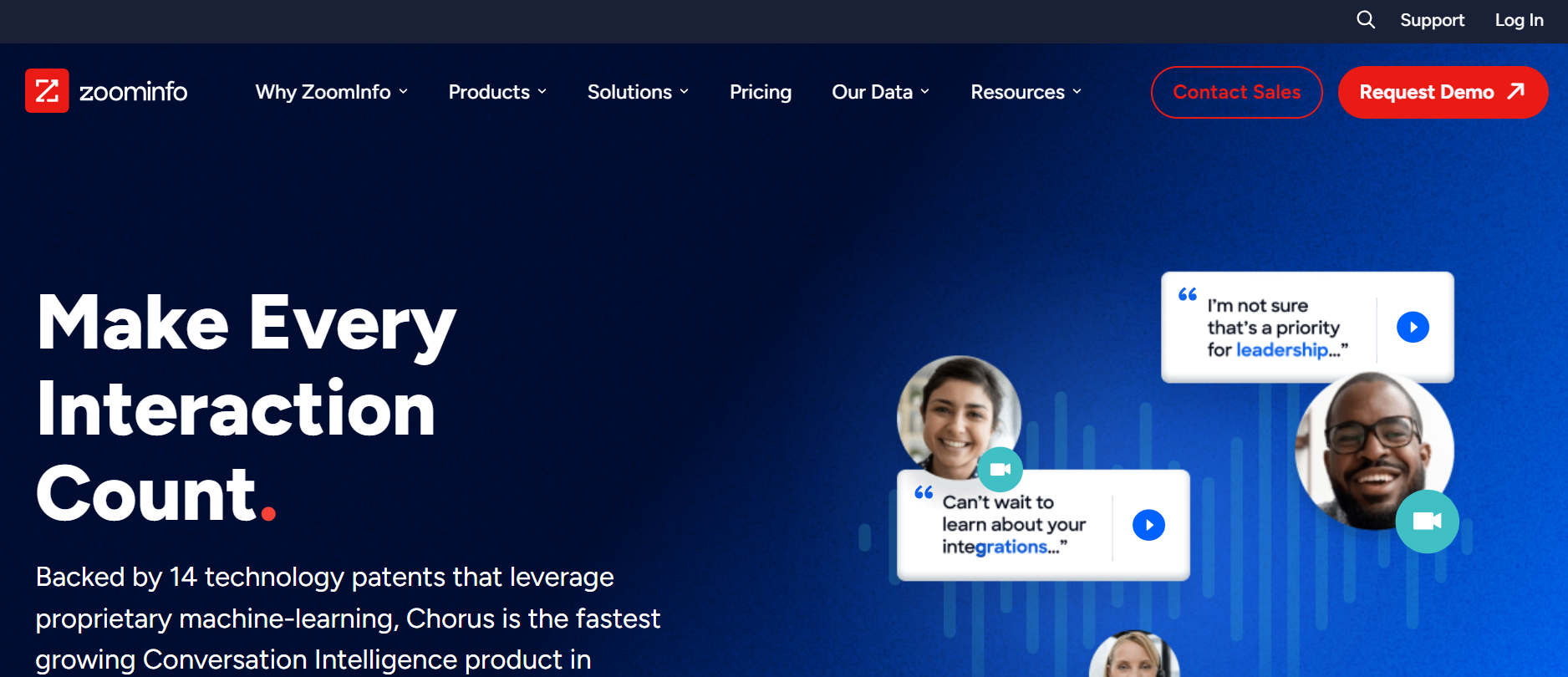
Chorus.ai helps sales teams analyze conversations and track sales performance using AI. It identifies trends in successful calls and provides actionable coaching for sales reps. By improving team performance and ensuring alignment with key goals, Chorus.ai directly impacts revenue growth.
Advantages✅
- Tracks and analyzes calls for sales team improvement.
- Provides coaching insights based on call performance.
- Helps identify trends and winning sales behaviors.
Disadvantages❌
- Higher pricing for smaller teams.
- Requires consistent data input for accurate insights.
- May require training to fully utilize advanced features.
4. Salesloft

Salesloft is a sales engagement platform that offers conversation intelligence to improve sales performance. It enhances revenue growth by tracking email and call activity, giving sales teams insights into what works best at each stage of the sales funnel.
Advantages✅
- Integrates conversation intelligence with CRM and email tracking.
- Offers pipeline management features to improve deal closure rates.
- Provides detailed analytics on calls and emails.
Disadvantages❌
- High cost for advanced plans.
- Complex setup and integration process.
- Steep learning curve for beginners.
5. Wingman
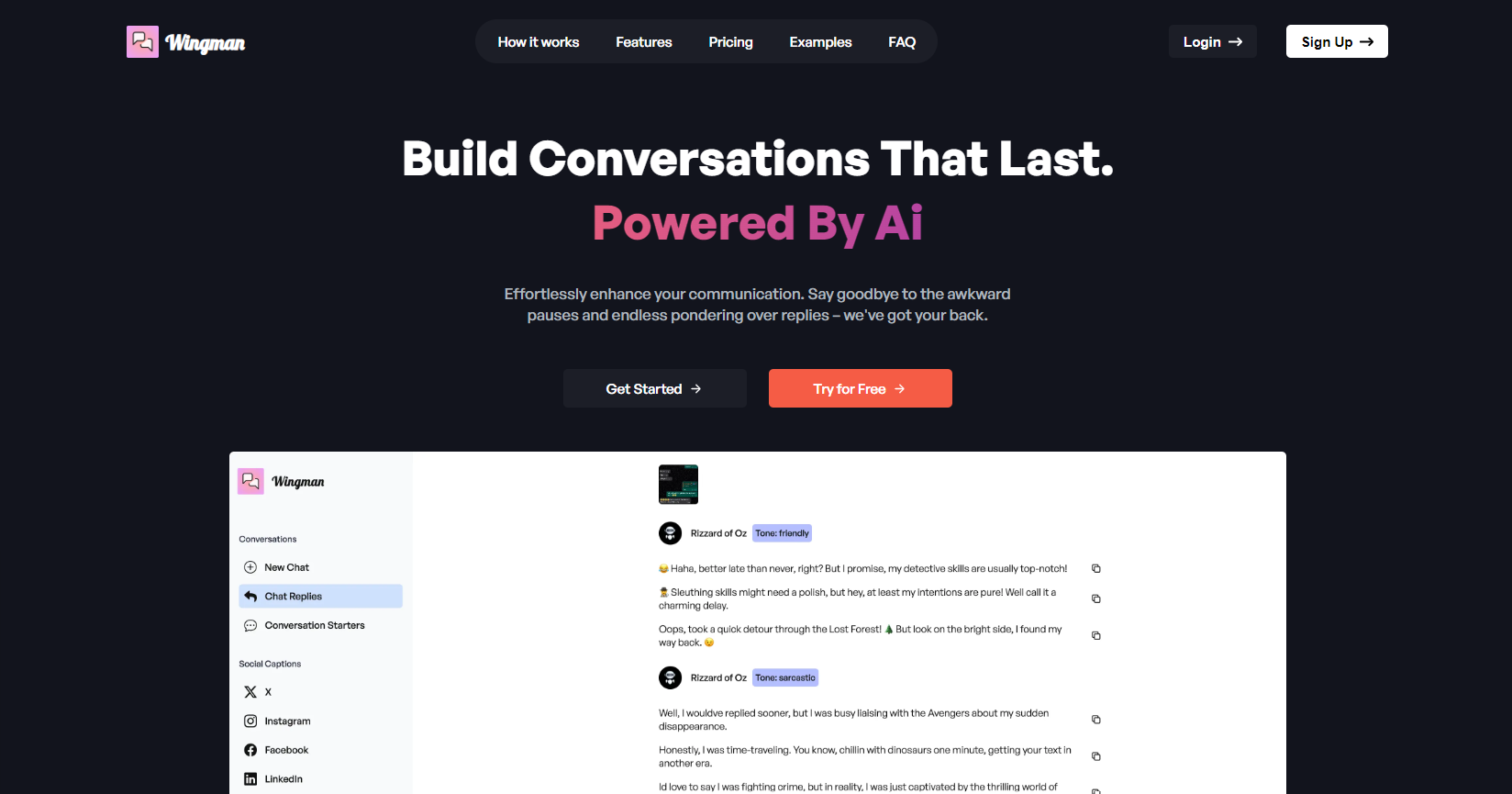
Wingman is an AI-driven conversation intelligence tool that provides real-time sales coaching by analyzing ongoing calls and offering feedback. It helps boost revenue by delivering actionable insights during calls, ensuring that sales teams can pivot their strategies in real-time for better outcomes.
Advantages✅
- Provides real-time feedback to sales reps during calls.
- Easy-to-use interface for call recordings and playbooks.
- Helps improve closing rates with immediate coaching.
Disadvantages❌
- Requires ongoing monitoring for maximum benefit.
- Limited customization options for advanced users.
- Can be overwhelming for new users unfamiliar with AI tools.
6. ExecVision
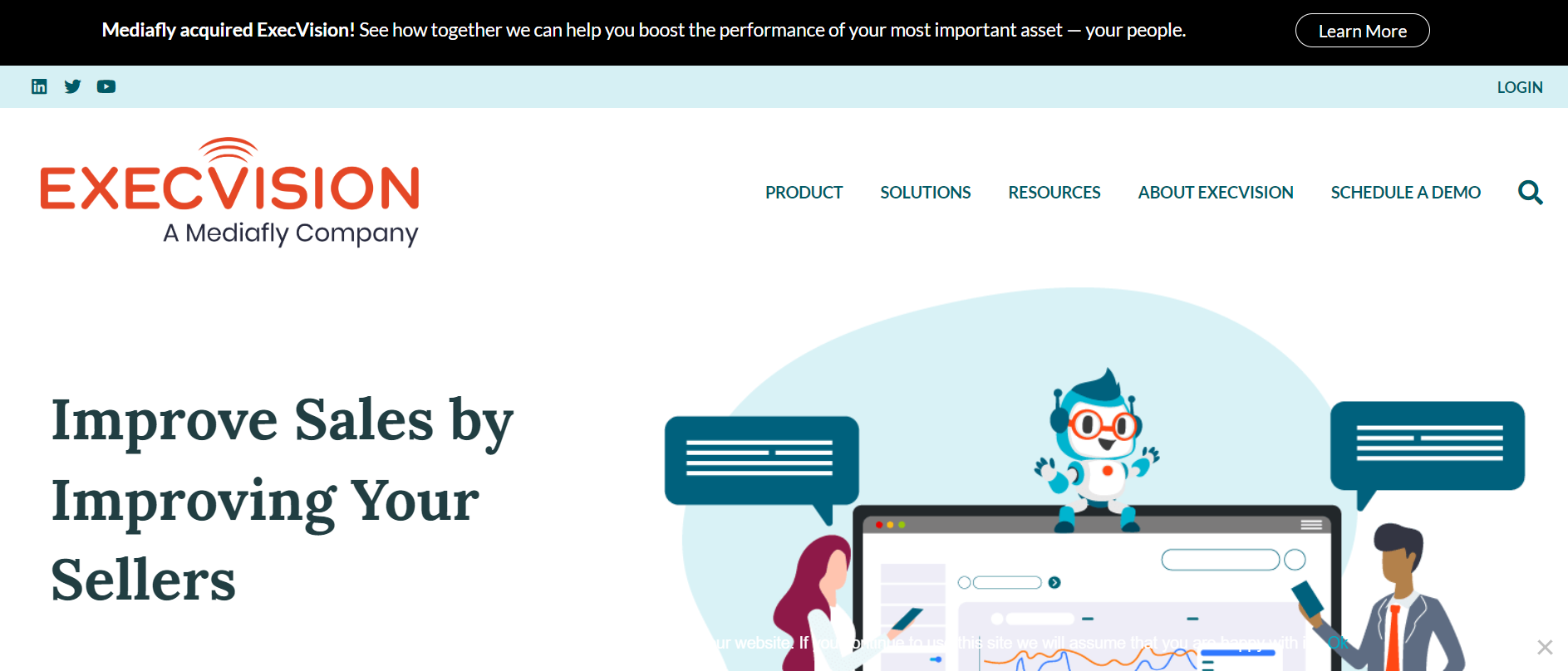
ExecVision is designed to improve sales outcomes by analyzing calls and delivering insights that help teams focus on what's working. It supports revenue growth by enhancing coaching and highlighting key conversations that lead to success.
Advantages✅
- Customizable call scoring for tailored coaching.
- AI-driven insights to identify winning behaviors.
- Comprehensive analytics on sales team performance.
Disadvantages❌
- Limited customization of reports.
- Requires integration with existing CRM systems.
- Higher-tier plans can be expensive.
7. Revenue.io
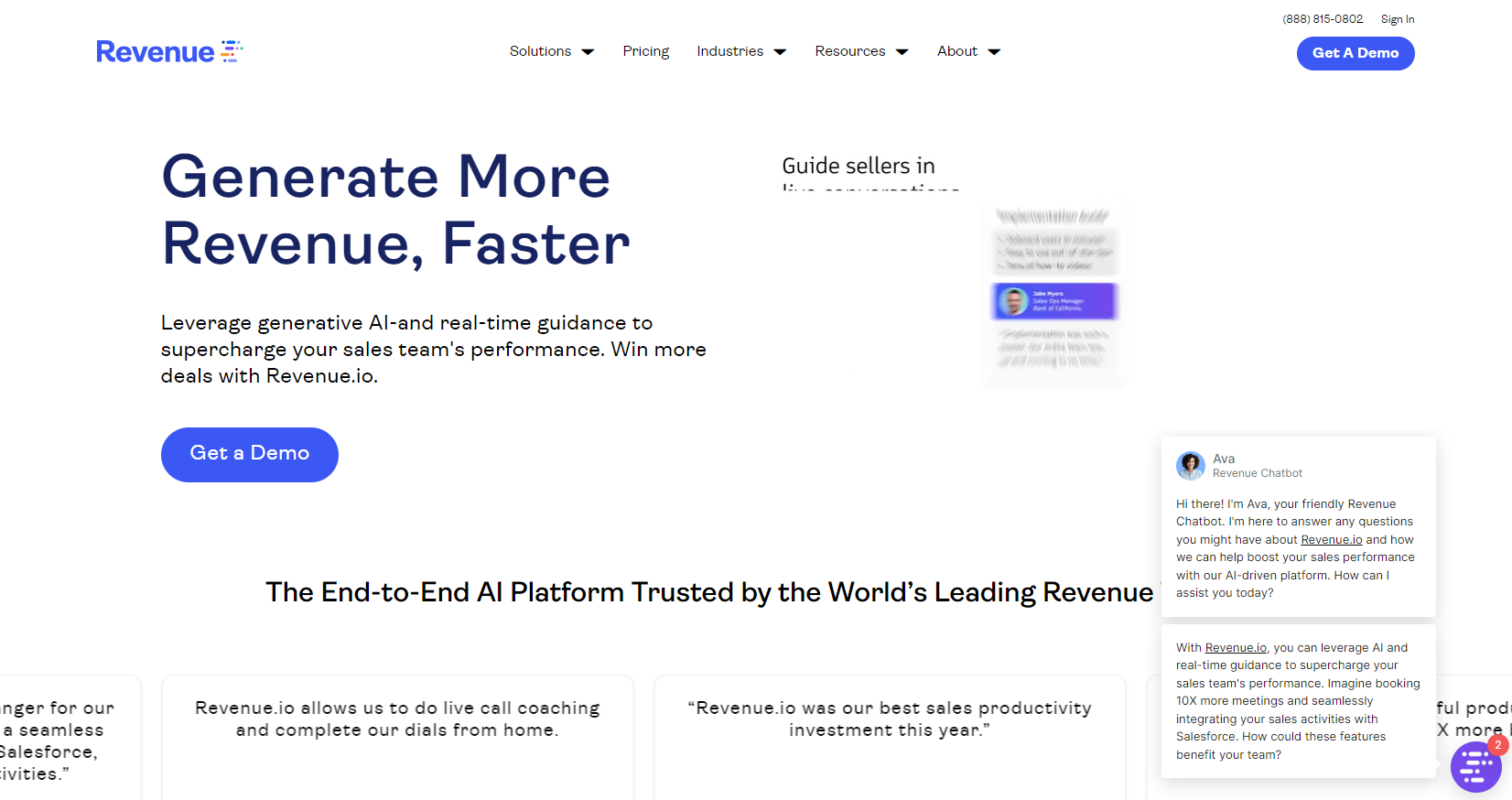
Revenue.io offers AI-driven conversation intelligence that provides real-time call insights and coaching for sales and customer service teams. Its features are designed to drive revenue growth by optimizing every customer interaction, ensuring better conversion rates and deal closures.
Advantages✅
- Real-time insights and recommendations for sales teams.
- Easy integration with CRM platforms.
- Enhances call performance with AI-driven coaching tools.
Disadvantages❌
- Requires time for initial setup and configuration.
- May not be as intuitive for non-technical users.
- Pricing may be prohibitive for smaller teams.
8. Allego

Allego helps sales teams improve their performance by analyzing sales calls and providing actionable insights. The platform supports revenue growth by highlighting successful sales tactics and offering suggestions for improvement during calls.
Advantages✅
- AI-based recommendations for sales improvement.
- Helps identify top-performing behaviors.
- Easy-to-use interface for call analysis.
Disadvantages❌
- Lacks some advanced features compared to competitors.
- Can be expensive for small teams.
- Requires customization for specific industry needs.
9. Outreach
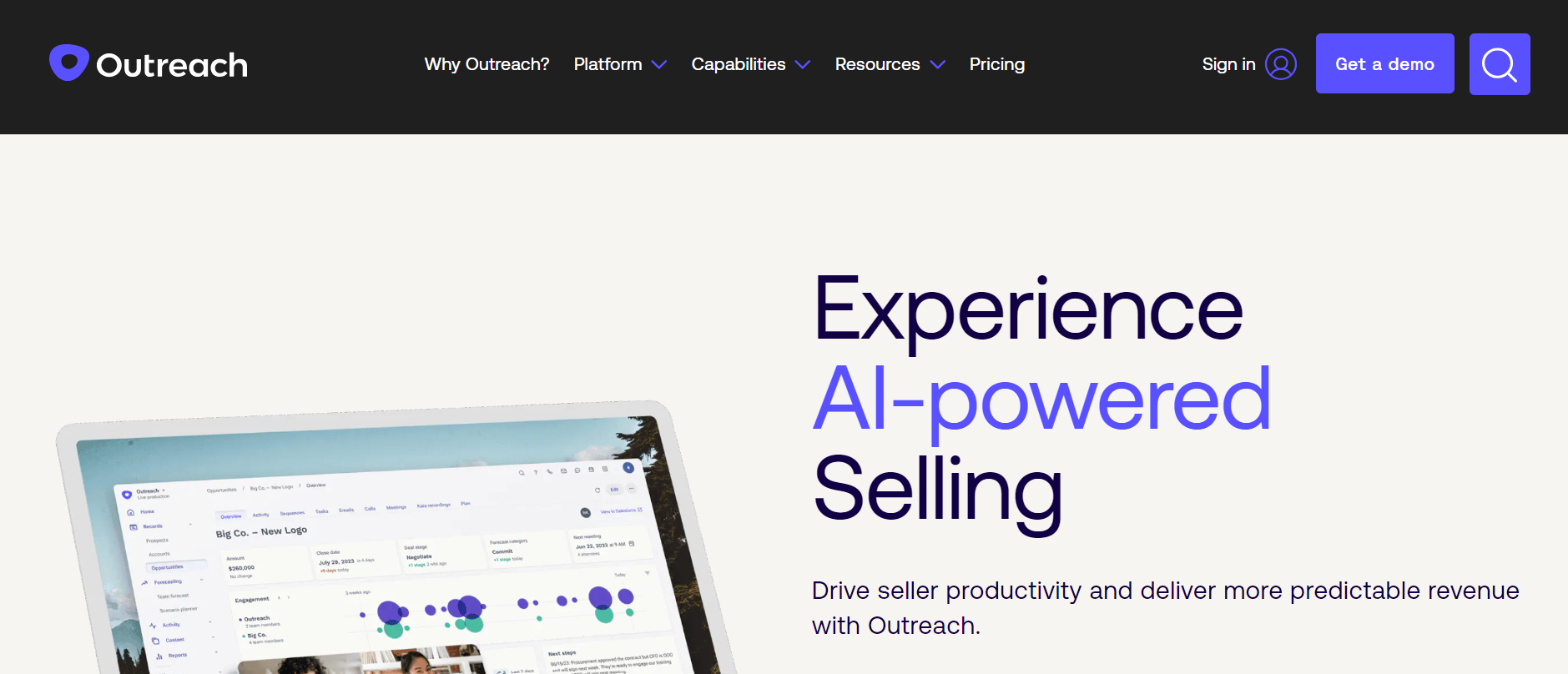
Outreach is a sales engagement platform that integrates conversation intelligence to help sales teams streamline their workflows. Its AI-driven recommendations help users improve interactions and close more deals, supporting long-term revenue growth.
Advantages✅
- AI-driven recommendations for optimizing sales strategies.
- Powerful call analytics and reporting features.
- Seamless integration with CRM platforms.
Disadvantages❌
- Expensive for small businesses.
- Steep learning curve for beginners.
- Requires frequent updates and monitoring.
10. Avoma
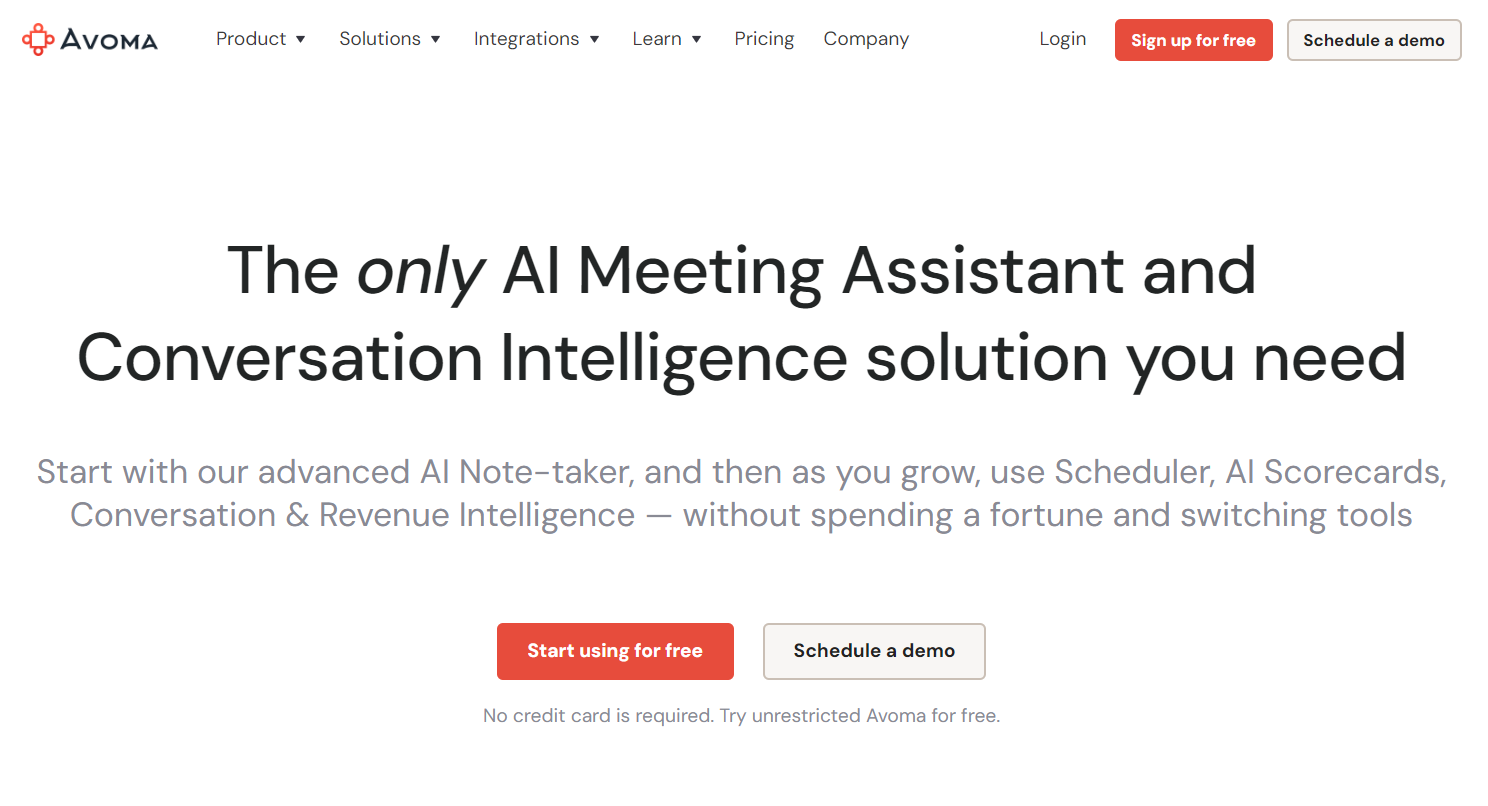
Avoma is an AI-powered meeting assistant that provides conversation insights and summaries for sales and customer interactions. It helps drive revenue growth by ensuring that key details from sales calls are captured and followed up on, improving deal conversion rates.
Advantages✅
- Automated meeting transcription and summaries.
- Provides actionable insights from customer interactions.
- Improves collaboration across sales teams.
Disadvantages❌
- Limited integration options compared to competitors.
- Can be pricey for small teams.
- Requires time to configure insights for specific business needs.
11. TalkIQ
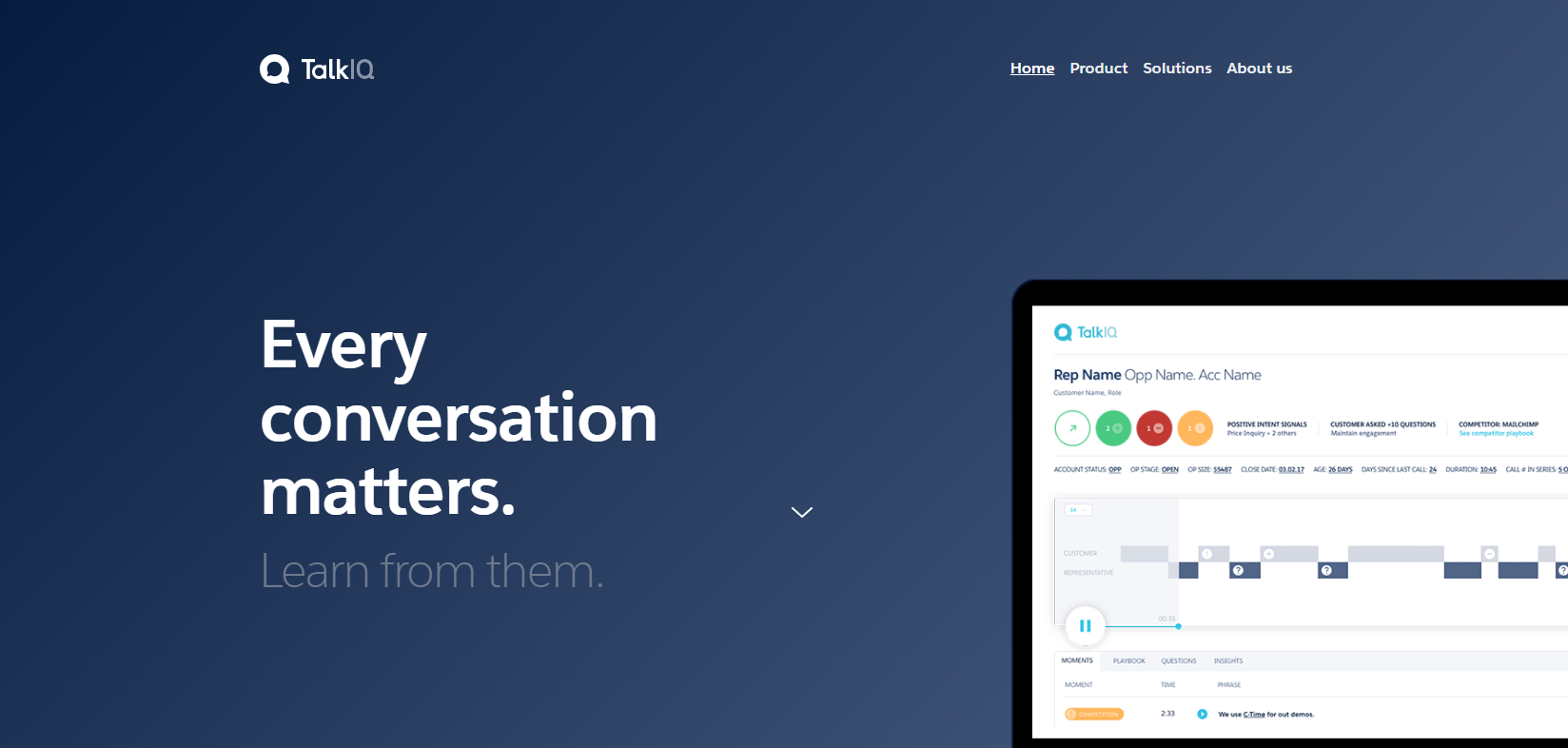
TalkIQ uses AI to analyze sales calls and provide real-time transcription and sentiment analysis. By tracking customer sentiment and identifying key moments, TalkIQ helps sales teams improve their communication, ultimately leading to increased revenue.
Advantages✅
- Real-time transcription and sentiment analysis.
- Helps improve customer communication during calls.
- Easy-to-use interface for tracking deal progress.
Disadvantages❌
- Limited reporting features.
- Can be costly for small businesses.
- Requires integration with existing sales platforms.
12. Tethr
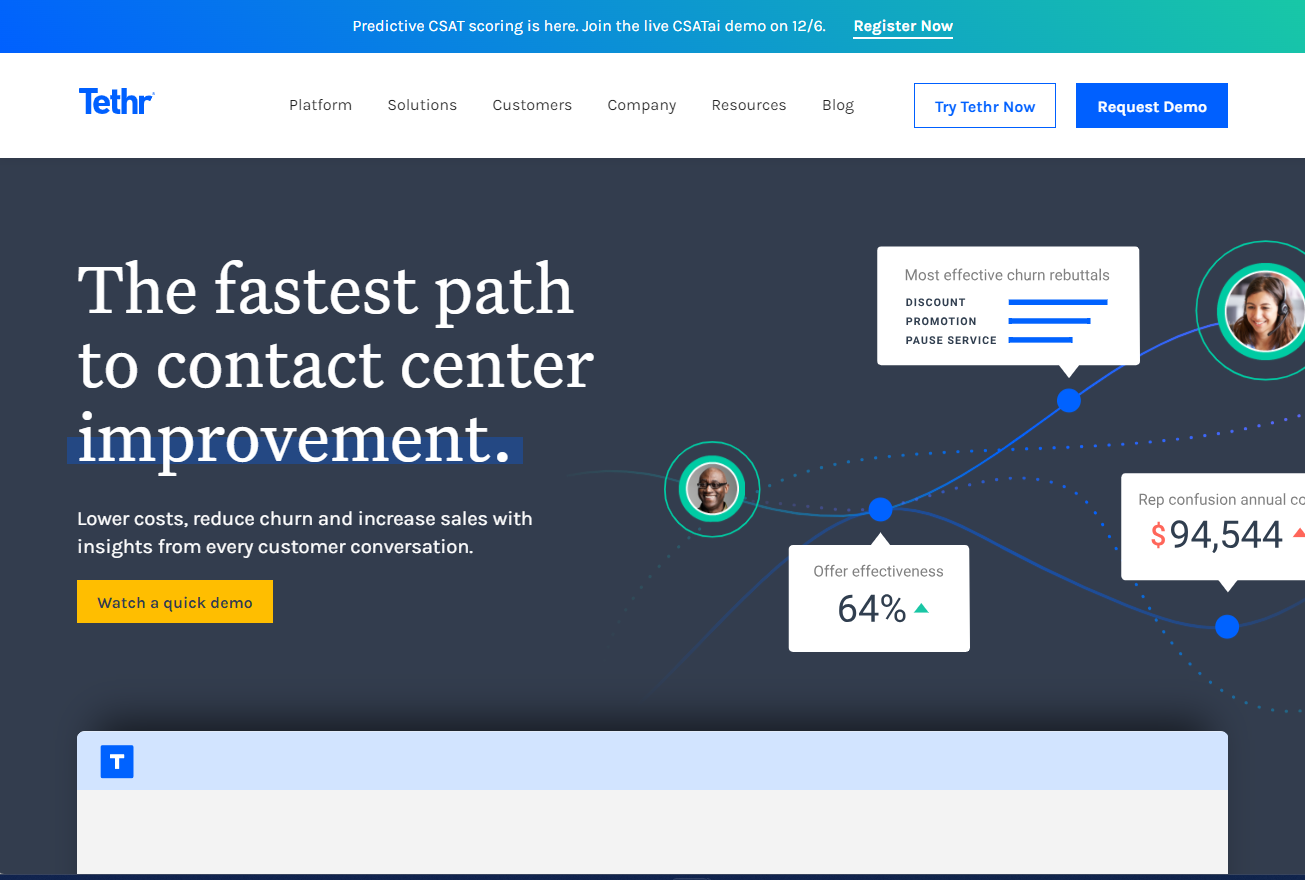
Tethr is an AI-based conversation intelligence platform that helps companies analyze calls and improve customer service and sales performance. It drives revenue by identifying patterns that lead to higher conversions and better customer retention.
Advantages✅
- Advanced conversation analytics for sales and customer service.
- Tracks agent performance for better coaching.
- Provides insights into customer satisfaction and loyalty.
Disadvantages❌
- Requires a significant amount of data for accurate analysis.
- High pricing for advanced features.
- May need dedicated training for full utilization.
13. Krisp
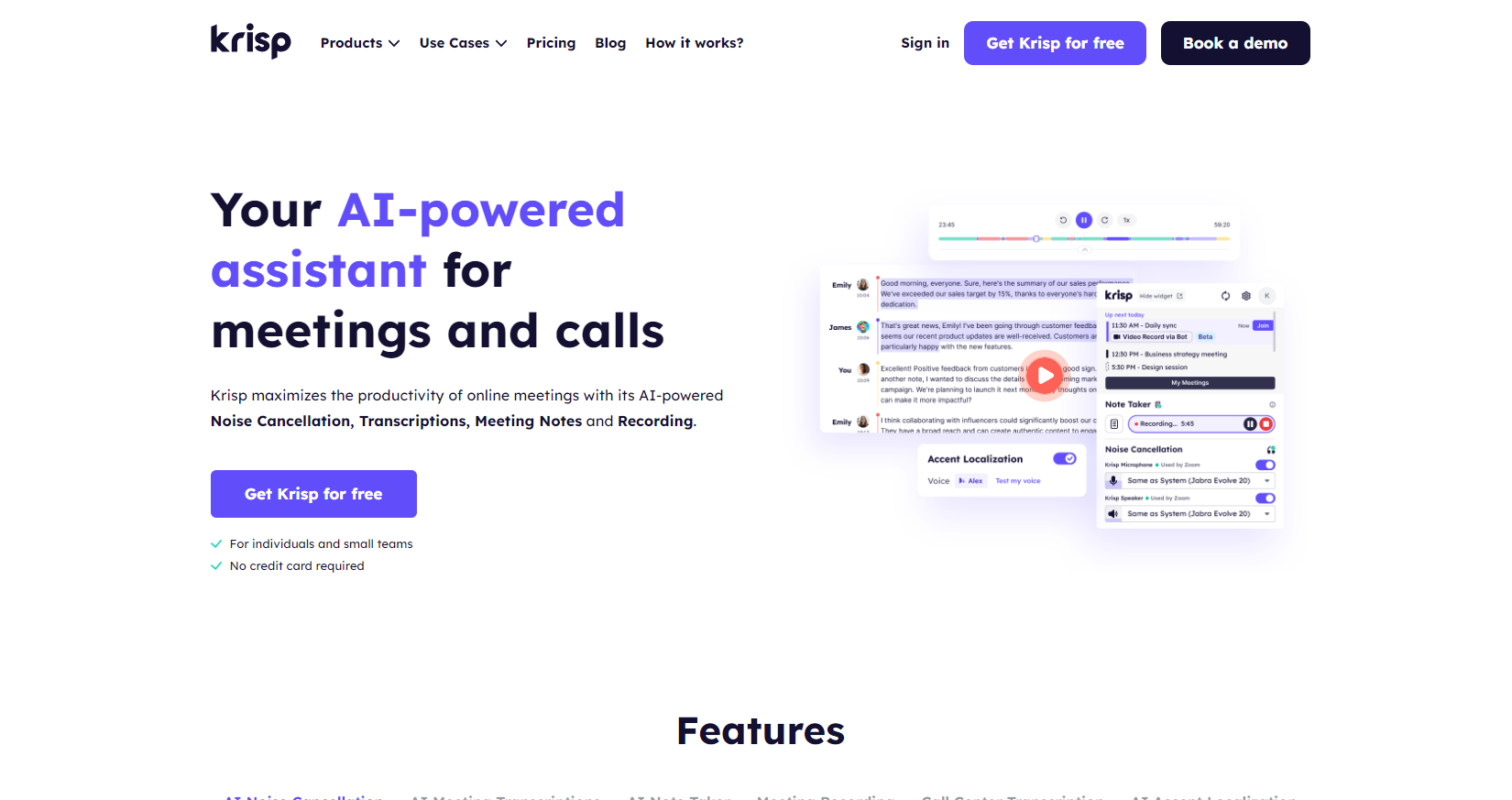
Krisp provides AI-powered noise cancellation and conversation intelligence, helping sales teams improve call quality and performance. By ensuring clearer communication, Krisp helps sales reps stay focused and close more deals.
Advantages✅
- AI-powered noise cancellation improves call clarity.
- Detailed analytics on call performance.
- Enhances customer interactions with clear communication.
Disadvantages❌
- Limited to audio-related features.
- Requires ongoing monitoring for maximum benefit.
- Higher-tier plans may be expensive for small teams.
14. Balto
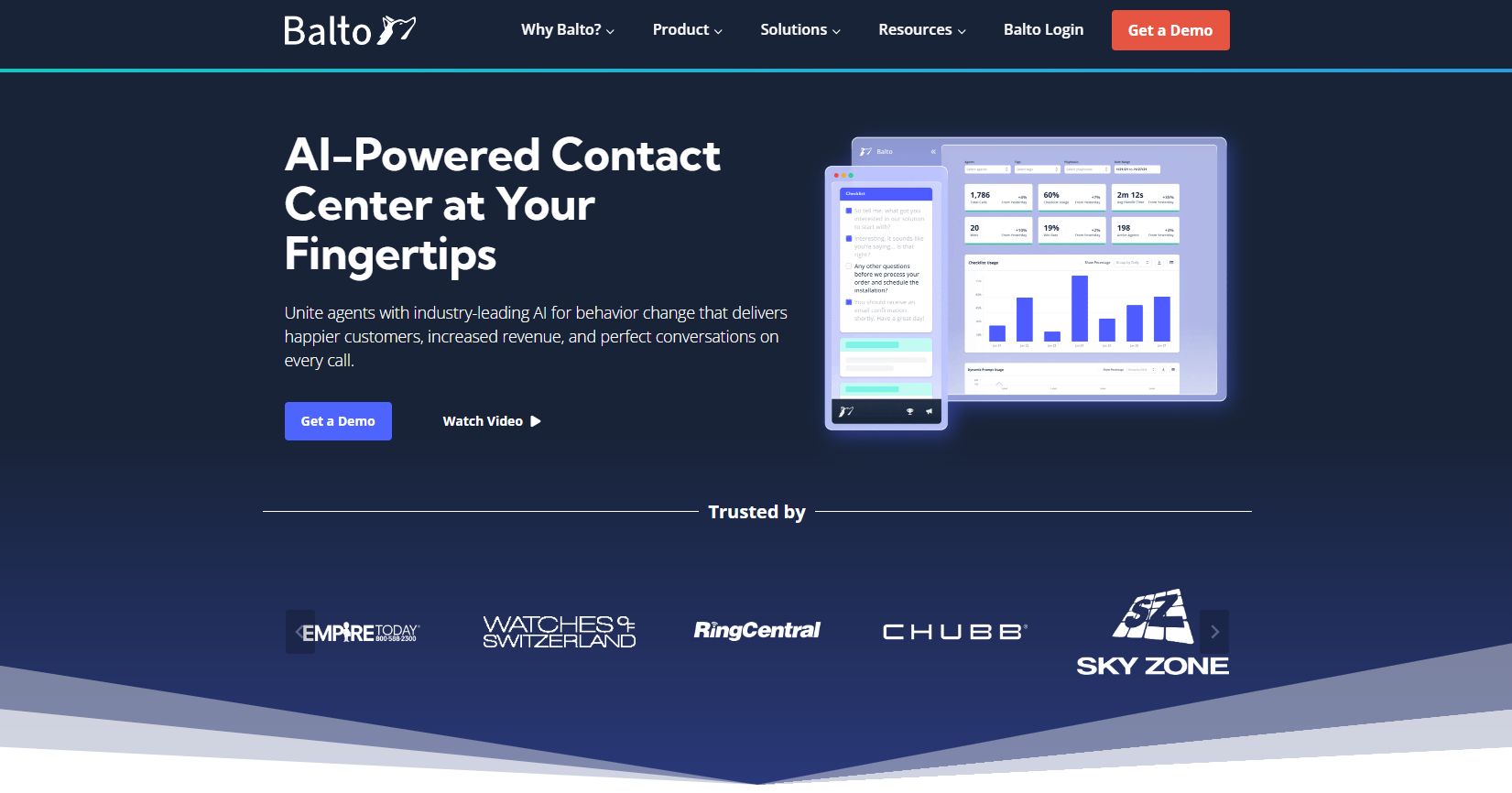
Balto provides real-time conversation intelligence for sales and customer service teams, offering real-time call guidance and coaching to help teams close deals faster. Balto drives revenue growth by providing immediate feedback that improves call performance and customer satisfaction.
Advantages✅
- Real-time call guidance helps close deals faster.
- Actionable coaching insights for improved performance.
- Easy-to-use dashboard for tracking call analytics.
Disadvantages❌
- Limited integration options compared to competitors.
- Requires setup and customization for specific industries.
- Can be expensive for smaller businesses.
15. Jiminny

Jiminny is a conversation intelligence platform that focuses on sales coaching and performance improvement. It helps sales teams win more deals by analyzing calls, identifying winning behaviors, and providing actionable coaching insights.
Advantages✅
- AI insights help identify successful sales tactics.
- Easy-to-use interface for tracking performance.
- Call transcription and real-time feedback.
Disadvantages❌
- Pricing may be prohibitive for smaller teams.
- Limited customization options.
- Requires time to analyze call data effectively.
16. CallRail

CallRail is a call tracking and analytics platform with conversation intelligence features that help businesses improve lead tracking and customer interactions. By analyzing conversations and lead sources, CallRail helps teams optimize their marketing and sales efforts for revenue growth.
Advantages✅
- Call tracking provides detailed insights into customer interactions.
- Easy-to-use interface for managing calls and leads.
- Integrates with CRM platforms for seamless workflow management.
Disadvantages❌
- Limited features for sales-specific insights.
- High pricing for advanced features.
- Requires integration with other tools for maximum value.
17. OrecX
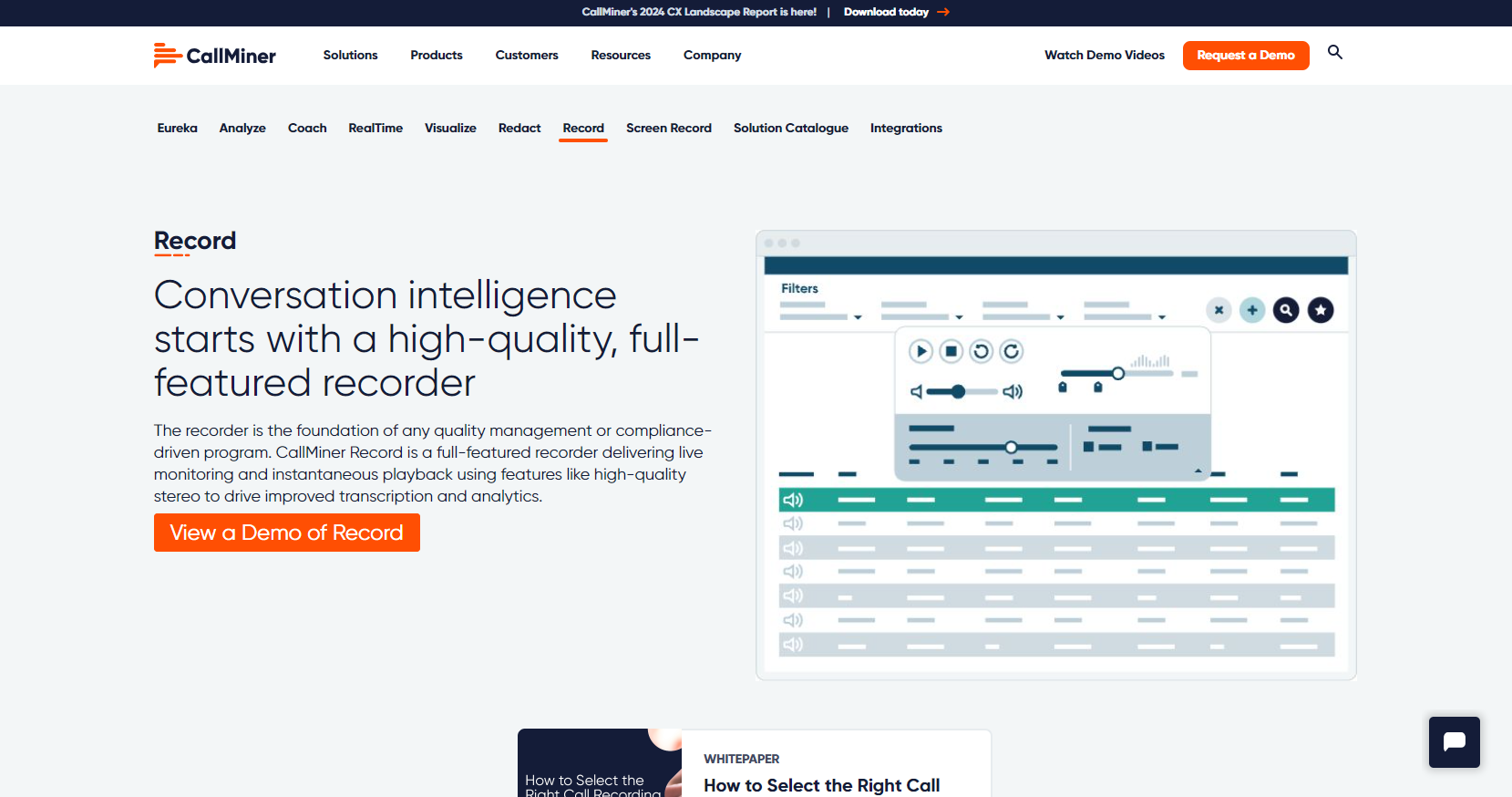
OrecX is an open-source call recording and conversation intelligence platform that helps teams analyze calls for improved performance. By providing voice analytics and API integration, OrecX supports revenue growth by improving communication and customer satisfaction.
Advantages✅
- Open-source platform for customizable features.
- Provides voice analytics for deeper insights.
- Easy API integration for enhanced functionality.
Disadvantages❌
- Limited features compared to proprietary solutions.
- Requires technical expertise for customization.
- May lack advanced AI-driven insights.
18. Observe.ai
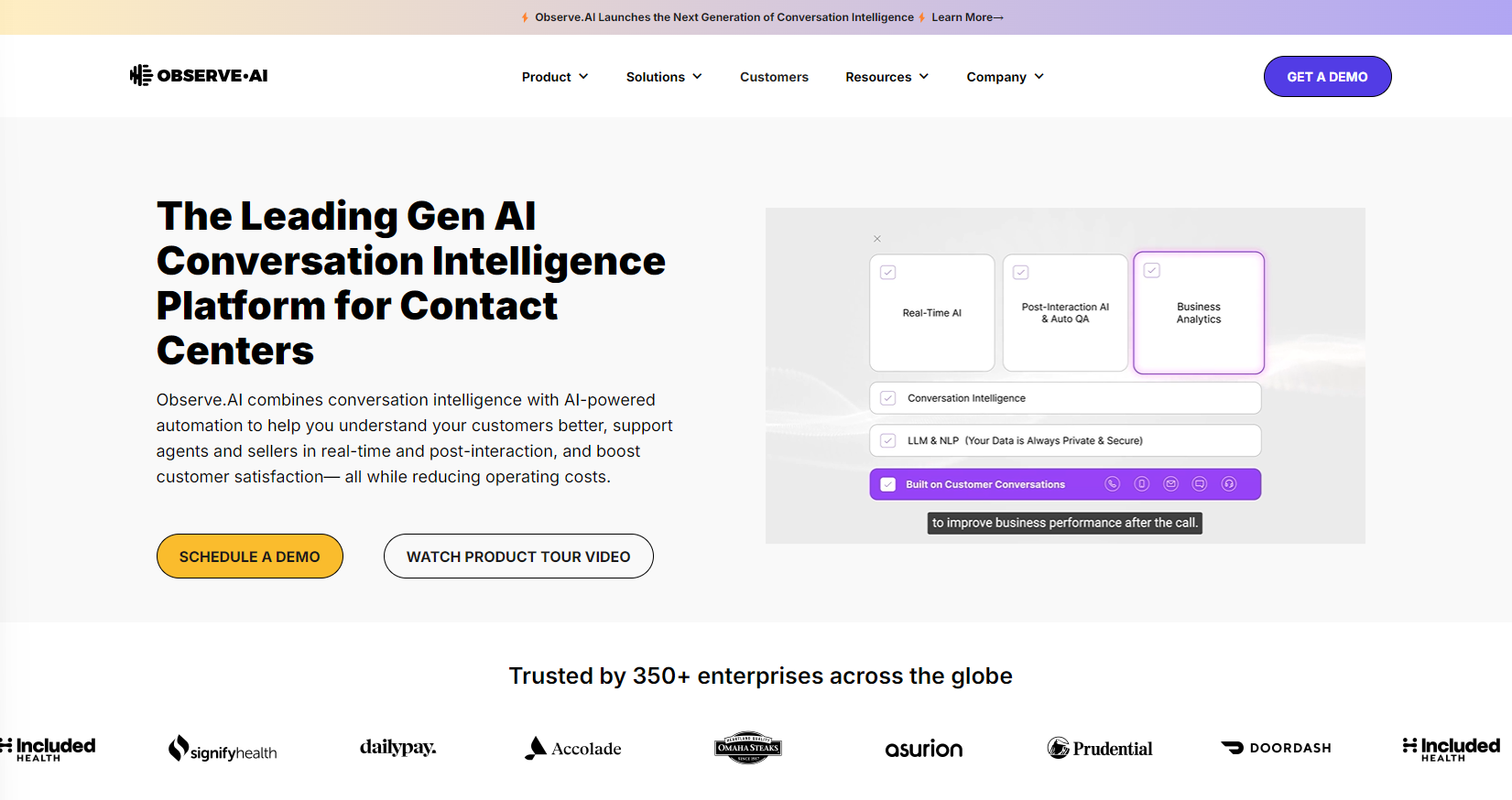
Observe.ai is an AI-powered conversation intelligence platform for call centers, helping agents improve performance and customer satisfaction through real-time analytics and coaching. It supports revenue growth by enhancing agent efficiency and ensuring better customer interactions.
Advantages✅
- Real-time analytics provide actionable feedback.
- Tracks agent performance and customer sentiment.
- Easy-to-use dashboard for monitoring calls.
Disadvantages❌
- Limited features for smaller teams or sales-specific use.
- Requires integration with CRM and call center software.
- Higher cost for advanced features.
19. Fireflies.ai
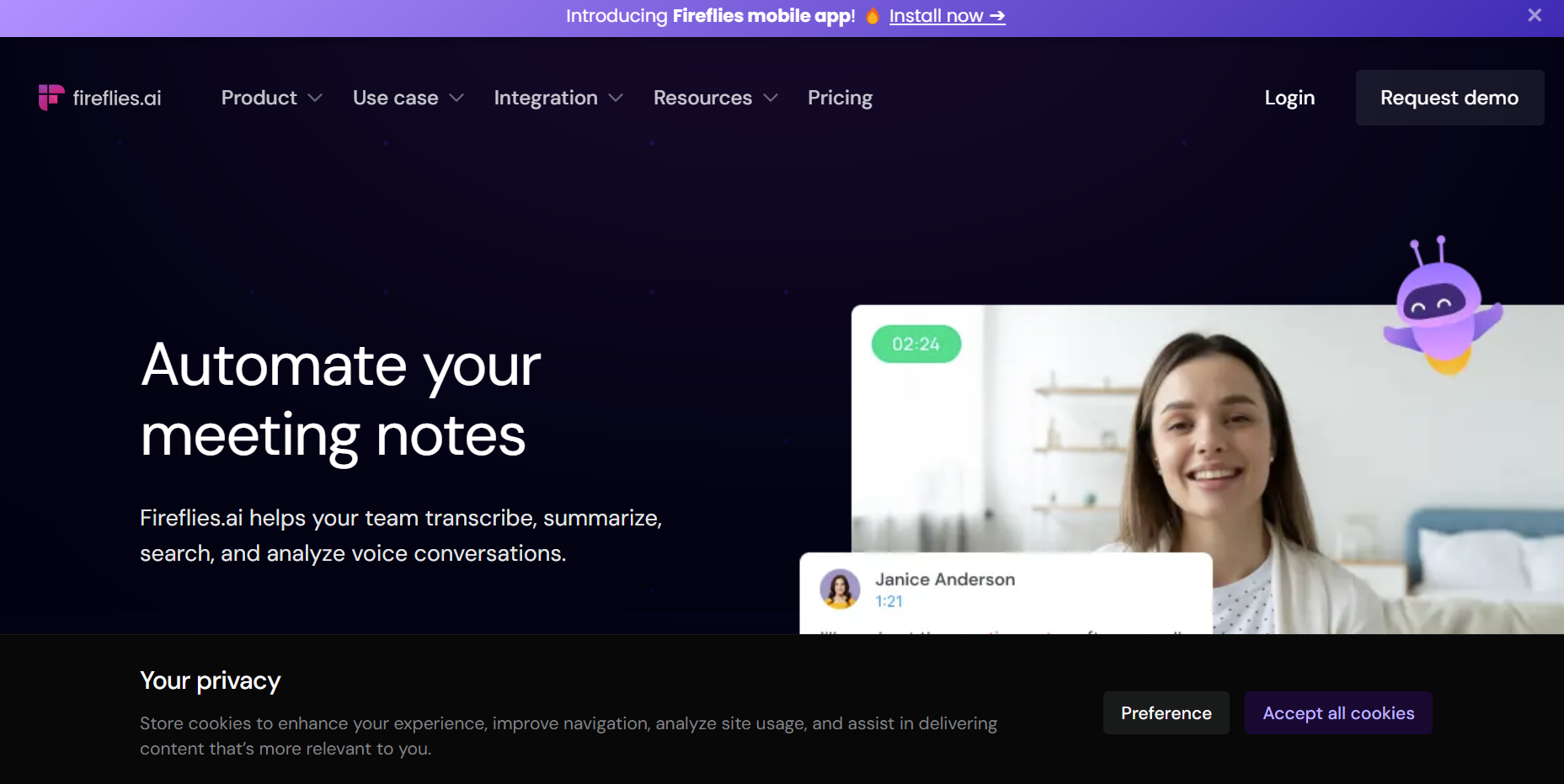
Fireflies.ai is an AI meeting assistant that transcribes and analyzes conversations, helping teams extract key insights for improved performance. By capturing critical information from sales calls, Fireflies.ai helps teams follow up effectively and close more deals.
Advantages✅
- Automated meeting transcription saves time.
- Actionable insights help improve performance.
- Easy integration with CRM and sales tools.
Disadvantages❌
- Limited customization options.
- May require manual intervention to ensure accuracy.
- Can be costly for smaller teams.
20. Trint

Trint is an AI-powered transcription platform that offers conversation intelligence for sales and customer service teams. It helps businesses improve their interactions by providing real-time transcription and actionable insights, supporting revenue growth through better communication.
Advantages✅
- Real-time transcription for faster analysis.
- Supports multiple languages for global teams.
- Easy-to-use interface for call analysis.
Disadvantages❌
- Limited integration with other sales tools.
- May require manual editing for transcription accuracy.
- Higher pricing for advanced features.
What is conversation intelligence?
To answer this question, it is important to explain that conversation intelligence is primarily about the ability to understand and analyze written conversations in order to extract important information.
In essence, we are all capable of this as humans, and conversation intelligence is not exclusive to AI. However, where AI becomes interesting is in its ability to quickly process large volumes of data automatically.
Indeed, by combining natural language processing and deep learning, it can analyze long audio or written conversations to extract key information. This data can be very useful for sales and customer service teams as it contributes to customer knowledge.
Why Is Conversation Intelligence Important for Sales and Customer Service Teams?
Advantages of conversation intelligence for sales teams
Imagine a world where every interaction is imbued with deep understanding and surgical precision in addressing customer needs, regardless of their stage in their journey.
Although this may seem somewhat utopian, this is precisely what conversation intelligence is moving towards. Let's explore its benefits for sales teams:
- Increased and accurate understanding of customers
- Identification of best sales techniques
- Onboarding optimization
- Identification and analysis of sales trends
AI tools like Empower by Ringover analyze your sales teams' conversations to understand what works and what doesn't, allowing you to optimize performance and ultimately improve your bottom line.
Understanding customers more quickly and accurately
Sales teams can use conversation intelligence to gain a better understanding of their customers' needs.
For example, when a customer interacts with a chatbot on a company's website, or by phone with a real agent, each question asked and each response provided is recorded and then analyzed.
The algorithms then deliver valuable insights into the most common concerns of customers, on a large scale, and not just on an individual basis.
Points of friction in the purchasing process, or the most requested products, features, and services are quickly identified.
Salespeople can thus better target their efforts, adapt their sales strategies, and personalize the customer experience to effectively meet their needs, no matter how specific. Ultimately, this helps to create closer relationships and sales opportunities that are more likely to succeed.
Identification of best sales practices
Communication is at the heart of any successful transaction. Conversation intelligence acts on this point as a catalyst.
How? Simply by providing you with the data on a silver platter to refine your communication skills based on conversations that have led to a sale.
The goal is to identify the levers, tactics, and even the words that have convinced prospects to become customers.a
Onboarding optimization
Joining a new team is not always easy. The recruit often has to familiarize themselves with current processes, learn to master various tools, record and understand a large volume of information to be effective.
Conversation intelligence can alleviate this pain point by guiding recruits through recommendations throughout their learning phase, helping them become self-sufficient more quickly.
Identification and analysis of trends
This is the last advantage we wanted to emphasize. You are not unaware that anticipating trends is important to remain competitive. By analyzing customer conversational data, you can, in some cases, anticipate their behavior and thus personalize the offers you make to them. Let's take a basic and concrete example.
Suppose a fruit delivery company uses a conversational platform to interact with its prospects and customers.
Through these interactions, artificial intelligence will collect a multitude of data, such as the most popular fruits, the regions where demand is strongest, the times of year when certain varieties are preferred, etc.
The company can even spot emerging trends such as the growing interest in certain fruits over a specific period. Based on this information, it can then decide to expand its range of products to include more options regarding these fruits at a given time.
Advantages of conversation intelligence for customer service
Conversation intelligence also offers interesting advantages to customer service teams:
- Respond quickly and accurately to customer requests
- Proactivity
- Availability
Respond quickly and accurately to customer requests
Conversational AI allows customer service teams to respond quickly and accurately to customer requests through the use of intelligent chatbots. For example, imagine a customer visiting a company's website and asking a question about a specific product via the chat window.
The chatbot, equipped with conversational intelligence, is able to analyze the customer's question and provide a relevant answer instantly, based on a previously established knowledge base.
If the chatbot fails to provide a satisfactory answer, it can also direct the customer to a human agent, providing precise context on the customer's request.
Thus, conversational intelligence enables a quick and accurate response to customer requests, thereby improving their overall experience.
Proactivity
Conversational intelligence tools can act as intelligent assistants to analyze verbal and textual interactions and identify customer needs, sometimes even before they express them explicitly.
This anticipation of needs and the ability to proactively address them not only increases customer satisfaction but also optimizes team efficiency by allowing them to focus their efforts on higher value-added tasks.
Always available customer service
Conversational intelligence transforms customer service by offering the possibility to remain operational 24/7, thanks to instant automated assistance, available even outside traditional office hours.
With the help of advanced chatbots and other automated response technologies based on AI, customers have the freedom to submit their questions, report incidents, or seek support at any time. Thus, it is no longer necessary to set up a telephone hotline, which has the advantage of reducing costs.
How does conversation intelligence work?
Conversation intelligence works by using technologies such as natural language processing (NLP). Let's take a closer look at this.
NLP allows for understanding, interpreting, and generating language. NLP uses techniques such as text segmentation, morphological analysis, syntax detection, and semantics.
Language understanding is essential for effective conversation intelligence. It allows the system to detect the intention behind the words used by the user to provide precise insights or a relevant response when it comes to a conversational chatbot.
An effective conversation intelligence system is also able to detect feelings and emotions. How?
By using sentiment analysis to determine if the terms used in a conversation are mostly positive, negative, or neutral. The most advanced conversation intelligence solutions also use speech emotion recognition.
This allows determining the speakers' emotions from an audio signal using data on pitch, voice tone, or even sound intensity.
Different types of conversation intelligence tools
Conversation intelligence relies on various tools that allow for analyzing conversations between a brand and its customers. Here are the main tools:
| Tool Type | Description | Tool Example |
|---|---|---|
| Conversation analysis tool | Technology that understands and analysis of human language | Empower by Ringover |
| Chatbots | A software that simulates human conversation via text | Intercom |
| Callbots | Virtual agent who can interact with humans via phone calls | Voximal |
| CRM | Some CRM software includes conversation intelligence | Hubspot |
| Content generation tool | Platforms which allow for automatic creation of text, often used for chatbot responses | ChatGPT |
Focus on Empower: Ringover's conversation intelligence technology
What to remember about conversation intelligence
Conversation intelligence offers many advantages to companies, especially to sales and customer service teams. It allows for a better understanding of customers and increased customization of interactions.
Coupled with a good strategy, conversational intelligence can lead to increased sales and customer satisfaction. Conversational intelligence tools are evolving very rapidly. They are becoming increasingly powerful, accessible, and their use offers a clear competitive advantage. Conversational intelligence is gradually becoming an indispensable set of technologies.
To learn more about how Ringover can help you adopt conversational intelligence within your organization, request a personalized demo and try a free trial of Empower now!
Conversation Intelligence FAQ
What are conversational AI tools?
- Chatbots
- Conversational analysis tools
- Generative AI tools
- CRM platforms
1. Chatbots
Chatbots are conversational agents that can interact with customers via text chat or voice. They use natural language processing (NLP) to understand customer requests and provide automated responses. Chatbots improve the customer experience and relieve teams of repetitive tasks.
2. Conversational analysis tools
Conversational analysis tools are designed to extract insights from interactions between customers and the company. They use advanced text and data analysis techniques to identify trends, customer sentiment, potential gaps in agent responses, but also positive points. These tools provide valuable information to optimise your setup and adjust sales and customer service strategies.
3. Generative AI tools
Generative AI tools are based on machine learning models to autonomously generate conversational content. Generative AI tools can create more flexible and natural responses than traditional chatbots by adapting to the nuances of human language and specific contexts. These tools are often used to enrich customer interactions by providing more personalised responses and simulating more authentic human conversations.
4. CRM platforms
CRM platforms (Customer Relationship Management) increasingly integrate conversational AI features to improve customer interaction management. They allow companies to track and manage conversations with customers across different channels, automate responses to common queries, and centralise customer data for a comprehensive overview. By combining conversational AI capabilities with traditional CRM features, these platforms offer a holistic approach to customer relationship management, thus promoting a consistent and personalised customer experience. If your CRM does not have conversational AI, you can integrate a third-party tool without having to change your entire technology stack, subject to compatibility between software.
Does conversation intelligence replace customer service agents and salespeople?
No, conversational intelligence is not intended to replace customer service agents or salespeople. In fact, it assists them by providing useful information about customers and how to improve their overall experience. Conversational intelligence allows them to focus on higher value-added tasks or on strengthening relationships with customers.
How do I implement conversation intelligence in my team?
Implementing conversational intelligence may require a certain level of AI knowledge and the help of specialists. First, discuss it with your technical team. You can then choose a conversational intelligence tool like Empower by Ringover, configure it according to your business, and train your team to use it. The solution is also very easy to use.
Whatever your choice on implementing conversation intelligence in your team, follow these steps:
- Set your goals
- Assess your needs
- Choose the right tools
- Integrate the tools into your technology stack and train your employees on their use
- Test and iterate
- Deploy and monitor
Published on April 18, 2024.
